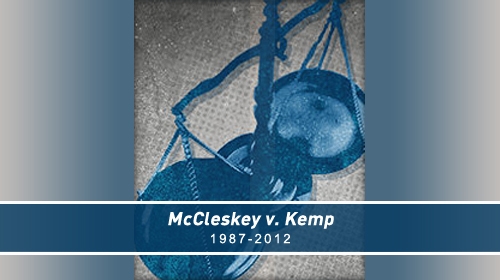
April 22 marks the 25th anniversary of the Supreme Court decision in McCleskey v. Kemp, in which the Court ruled that a defendant cannot rely upon statistical evidence of systemic racial bias to prove his death sentence unconstitutional, no matter how strong that evidence may be. McCleskey has been roundly condemned as a low point in the quest for equality that begs to be revisited. To mark the occasion, every day this week the ACLU Blog of Rights will feature a new post about McCleskey and its legacy. You can read all the posts here, and visit mccleskeyvkemp.com to learn more.
As we mark the 25th anniversary of McCleskey v. Kemp, international concern is growing over the crippling inadequacies of the death penalty in the United States, including the enormous racial disparity in its imposition. This September, the U.N. Secretary General will submit a report to the Human Rights Council on the question of capital punishment. In preparation for the report, the ACLU submitted a written statement to the Office of the U.N. High Commissioner for Human Rights noting:
Numerous studies establish that murder of whites, particularly by blacks, results in capital prosecution in far higher percentages than murders of people of color. In its recent periodic report to the U.N. Human Rights Committee, the U.S. government acknowledged ‘the overrepresentation of minority persons, particularly Blacks/African Americans, in the death row population.’ Beyond North Carolina, U.S. constitutional law continues to prevent successful challenges to these racist practices. U.S. law has also failed to eradicate discrimination in jury selection, and people of color continue to be excluded from capital juries at alarming rates.
Despite our government’s own admission and acknowledgement of such overrepresentation, some federal and state government officials seem shockingly unconcerned. Philip Alston, the former U.N. Special Rapporteur on extrajudicial, summary, or arbitrary executions, visited the United States in 2008 at the invitation of the Bush administration and met with federal and state officials, judges, civil society groups (including the ACLU), victims, and witnesses throughout the country. He too found that “the weight of scholarship suggests that the death penalty is more likely to be imposed when the victim is white, and/or the defendant is African American.” Yet when Alston raised racial disparity concerns with individual federal and state government officials, he writes:
I was met with indifference or flat denial. Some officials had not read any specific reports or studies on race disparity and showed little concern for the issue. […] These responses are highly disappointing. They suggest a damaging unwillingness to confront the role that race can play in the criminal justice system generally, and the imposition of the death penalty specifically.
But the evidence is just too clear and too extraordinary to justify such nonchalance. In a recent ACLU briefing paper, we explained:
A 2000 Justice Department study [found] wide racial and geographic disparities in the federal government’s requests for death sentences. In 2011, racial minorities constituted 56% of the 3,220 people on death row. In 96% of states where race studies have been conducted, involving either race of victim or race of defendant, both disparities have been observed. […] Immediately, the Obama Administration should fulfill its explicit commitment to undertake a new federal study examining the racial disparities in the application of the death penalty.
When the Supreme Court first struck down the death penalty in 1972, it castigated capital punishment as so arbitrary as to be akin to “being struck by lightning.” And after the reinstatement of executions in 1976, studies by European and U.N. human rights bodies, and even the United States government, have conclusively shown something much more alarming: that these lightning strikes are guided by race, class and geography.
It is therefore unsurprising that the legitimacy of our death penalty is imploding on the world stage, especially as the number of countries that still practice executions dwindles. Only 20 countries still carry out the death penalty, down from 31 a decade ago. In 2011, the top five executioners were China, Saudi Arabia, Iraq, Iran and the United States, which executed 43 people out of the 676 known to have been executed worldwide that year. This is not the company we want to keep. Worse, we are showcasing to the world that race discrimination is at the core of our system of capital punishment, and our own judicial system is still voluntarily blind to its poisonous presence.
Learn more about race and the death penalty: Sign up for breaking news alerts, follow us on Twitter, and like us on Facebook.


